ag-, agen-, act-, agi-, agit-
(Latin: to set in motion, to hurry, to shake; to drive; to do, to act; to lead, to conduct, to guide)
1. An agent that produces clotting: A coagulant converts a fluid or a substance that is in a solution into a solid or gel.
2. An agent that causes, stimulates, or accelerates coagulation: A coagulant is a substance that has a congealing or thickening effect, especially with reference to blood.
3. Etymology: from Middle French coaguler, from Ltin coagulatus, past participle of coagulare, "to cause to curdle"; from cogere, "to curdle, to collect"; from com-, "together" + agere "to drive".
2. An agent that causes, stimulates, or accelerates coagulation: A coagulant is a substance that has a congealing or thickening effect, especially with reference to blood.
3. Etymology: from Middle French coaguler, from Ltin coagulatus, past participle of coagulare, "to cause to curdle"; from cogere, "to curdle, to collect"; from com-, "together" + agere "to drive".
coagulate (verb), coagulates; coagulated; coagulating
1. To convert, to clot, or to curdle a fluid or a substance that is in a solution into a solid or a gel: When Nancy accitdentally poured old and spoiled cream into her coffee, it coagulated by curdling into tiny floating lumps and the coffee tasted awful!
2. Etymology: from Middle French coaguler, from Latin coagulatus, past participle of coagulare, "to cause to curdle"; from cogere, "to curdle, to collect"; from com-, "together" + agere "to drive, to move".
2. Etymology: from Middle French coaguler, from Latin coagulatus, past participle of coagulare, "to cause to curdle"; from cogere, "to curdle, to collect"; from com-, "together" + agere "to drive, to move".
coagulated (adjective), more coagulated, most coagulated
Pertaining to something that changes from a fluid form to a soft, more semisolid, or solid substance; curdled: The fresh milk stood overnight on the counter in the kitchen and the next morning the children didn't want to drink coagulated milk for breakfast! No wonder!
1. The process of forming semisolid lumps in a liquid: Coagulation can take place in milk and in milk products.
2. In medicine, the clotting of blood or the process by which the blood clots to form solid masses: Tissue can also be subjected to coagulation by various means, as by electrocoagulation (coagulation [clotting] of tissue using a high-frequency electrical current applied locally with a metal instrument or needle with the aim of stopping bleeding); laser coagulation (produces light in the visible green wavelength that is selectively absorbed by hemoglobin, the pigment in red blood cells, in order to seal off bleeding blood vessels); or photocoagulation (coagulation [clotting] of tissue using a laser which produces light in the visible green wavelength that is selectively absorbed by hemoglobin, the pigment in red blood cells, in order to seal off bleeding blood vessels).
2. In medicine, the clotting of blood or the process by which the blood clots to form solid masses: Tissue can also be subjected to coagulation by various means, as by electrocoagulation (coagulation [clotting] of tissue using a high-frequency electrical current applied locally with a metal instrument or needle with the aim of stopping bleeding); laser coagulation (produces light in the visible green wavelength that is selectively absorbed by hemoglobin, the pigment in red blood cells, in order to seal off bleeding blood vessels); or photocoagulation (coagulation [clotting] of tissue using a laser which produces light in the visible green wavelength that is selectively absorbed by hemoglobin, the pigment in red blood cells, in order to seal off bleeding blood vessels).
A disease affecting the coagulability of the blood: Because the wound of Jane's hand wasn't healing well, she went to Dr. Smart who diagnosed it as being a case of coagulopathy, a weakness or disorder in the blood clotting process.
A situation in which someone or something is convincing or persuasive: At the trial, the cogency of the overwhelming evidence assured the judge of the correct verdict.
cogent (adjective), more cogent, most cogent
1. A descriptive term for appealing to the intellect or powers of reasoning; convincing: Sharon presented a cogent argument for raising the prices for the scarce items.
2. Etymology: from French cogent, "necessary, urgent" (14 century); from Latin cogentem , from cogere, "to curdle, to compel, to collect"; from com-, "together" + agere, "to drive".
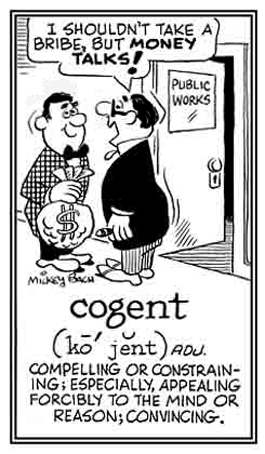
© ALL rights are reserved.

© ALL rights are reserved.

© ALL rights are reserved.
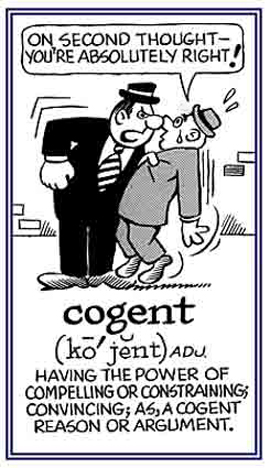
© ALL rights are reserved.
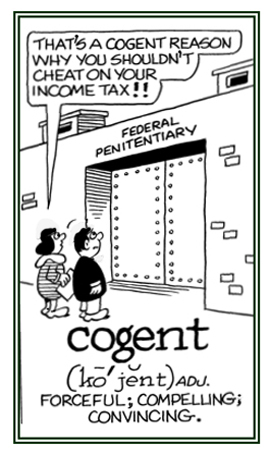
© ALL rights are reserved.
Go to this Word A Day Revisited Index
2. Etymology: from French cogent, "necessary, urgent" (14 century); from Latin cogentem , from cogere, "to curdle, to compel, to collect"; from com-, "together" + agere, "to drive".





Go to this Word A Day Revisited Index
for a list of additional Mickey Bach illustrations.
cogently (adverb), more cogently, most cogently
Descriptive of how a reasonable and convincing procedure is based on evidence: Jack cogently explained to his teacher why he wasn't able to finish his homework by showing Mr. Smart the chewed up remains of his assignment.
cogitate (verb), cogitates; cogitated; cogitating
1. To think deeply and carefully about something; to ponder: When James got back to the university dormitory, he sat at his desk and started to cogitate about the science project he was supposed to complete in three days.
2. To consider seriously; to reflect upon; to turn over in one's mind: When the election for President of the U.S. takes place, voters will be cogitating about which candidate will be the best one for the country.
3. Etymology: from Latin cogitatus, past participle of cogitare, "to ponder, to weigh, to reflect, to think", from co-, short for com-, "with, together" + agitare, "to put in constant motion, to drive, to impel"; from agere, "to set in motion, to drive, to lead".
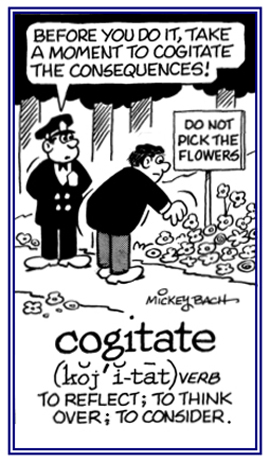
© ALL rights are reserved.
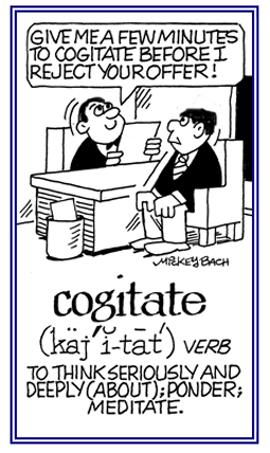
© ALL rights are reserved.
Go to this Word A Day Revisited Index
2. To consider seriously; to reflect upon; to turn over in one's mind: When the election for President of the U.S. takes place, voters will be cogitating about which candidate will be the best one for the country.
3. Etymology: from Latin cogitatus, past participle of cogitare, "to ponder, to weigh, to reflect, to think", from co-, short for com-, "with, together" + agitare, "to put in constant motion, to drive, to impel"; from agere, "to set in motion, to drive, to lead".


Go to this Word A Day Revisited Index
so you can see more of Mickey Bach's cartoons.
1. Thoughtful and attentive consideration and meditation: After much cogitation and mulling over, James decided to take the offer of the job in his hometown.
2. A careful and serious mental reflection about something: David applied all of his cogitation and energy, contemplating what topic he should take for the next term paper in his science class at school.
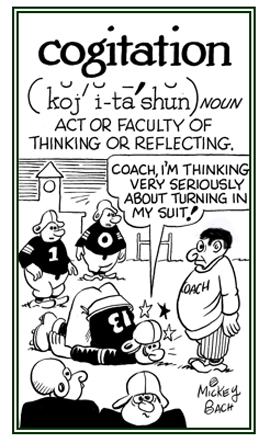
© ALL rights are reserved.
Go to this Word A Day Revisited Index
2. A careful and serious mental reflection about something: David applied all of his cogitation and energy, contemplating what topic he should take for the next term paper in his science class at school.

Go to this Word A Day Revisited Index
so you can see more of Mickey Bach's cartoons.
cogitative (adjective), more cogitative, most cogitative
Referring to an inclination to or capability of serious thought: When Jack entered the room, both of his parents had cogitative expressions on their faces and asked him to sit down.
cogitatively (adverb), more cogitatively, most cogitatively
A reference to how a person meditates, contemplates, or is thoughtful: The lawyer cogitatively looked at his client and agreed to take on his case.
A person who contemplates, ponders, or mulls over something: A good example of a cogitator is The Thinker, the bronze sculpture by Auguste Rodin created in 1904.
Cogito ergo sum. Deo gratias. (Latin phrase)
I think, therefore I am. Thanks be to God.
Motto of Shorter College, North Little Rock, Arkansas, USA.
Cogito, ergo doleo. (Latin phrase)
I think, therefore I am depressed.
Also translated as, "I think, therefore I exist."
Credited to Descartes [French philosopher] as a priori proof of one's existence in his Discourse on Method, and is used as the starting point for his philosophic system.


